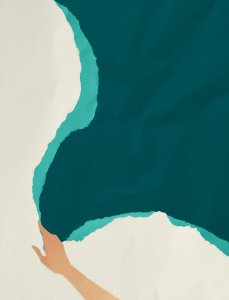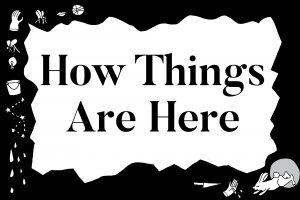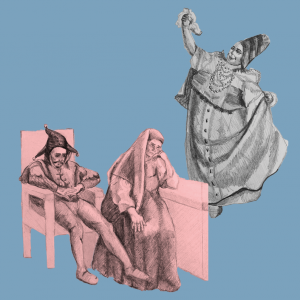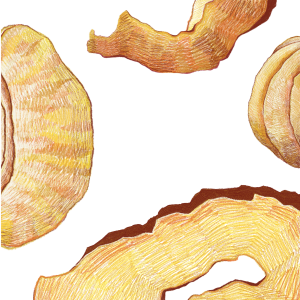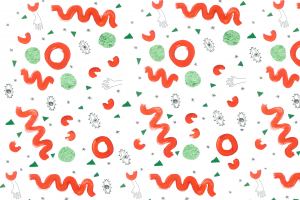Anna and Mary
by Madeleine Jacob | March 20, 2024
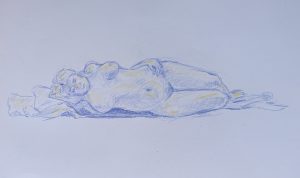
Anna put her index finger to her mouth, found the sore molar and pressed down on it. The layer of phlegm in the back of her throat was still faintly sweet. She put the jar of honey back in the cupboard. As a child, she had ground her teeth as she slept; she couldn’t help but suspect that her teeth were now flatter and smaller than they would have been otherwise.
By noon Anna was pressing her face against the cold exterior of the University Church. Opposite Anna, Mary picked her nail beds while reading.
Anna raised her head and began to speak rapidly. “It’s such a weird experience. You just lie there for ages looking at the ceiling. They’ve got this image of the sky, backlit, suspended above you while they drill your teeth and wash them out and—” Anna let out a choked laugh, “soldier them.”
“Oh yeah?” Mary closed her book. It had a portrait of Elizabeth I on the cover: young and pale with a single thin finger inserted into the gilt book she held at her navel. Mary momentarily assumed the same position to mark her page.
“And this guy—the dentist—kept tutting and groaning all the way through.”
Mary arranged her face to look sympathetic. She’d had enough of Anna’s constant reprisal of the details of her root canal treatment the week before. Mary had tripped from genuine interest to tolerance to irritation. Anna’s fantasies about the dentist who’d been prescribing her round after round of potent antibiotics, were, thought Mary, symptomatic. Four months ago, Anna broke up with Ben and promptly developed severe toothache in her back molar. Anna’s relationship talk had notably given way to a stream of dental information. Mary could see that Anna was in an extreme state of psychological entanglement—her mother was a psychoanalyst.
Anna returned her face to the church wall, complexion grey as the stone. The bell above them began to ring frenetically. They had a tutorial within the hour. Mary had diligently written the essay, but Anna had only poked at the novel she was writing on, fingering it mistrustfully with her broken prose.
By the evening, Mary found herself at Ben’s elbow in the college bar. He turned away from her, jutting his chin towards the ceiling. So, there was a great distance between them now. She felt it—a psychic plane—stretching out before her as an undulating terrain.
Ben was almost glittering with anxiety. His curly hair was slicked back but his eyes were watery and twitching; usually he would be at ease. Mary wanted to reach out and touch him; to give him a gentle push and shore him up.
The river that bounded the city was breaking its banks, licking embankments hungrily and seeping into springy earth and low-slung houses. Playing fields became ponds. Flocks of white-fringed geese alighted on their surfaces, furring the wetted landscape like pale fungi.
Anna’s bedroom overlooked the river. Early the next morning, she rocked on her toes, shifting her weight between her feet as she propped herself up above the windowsill. The draught cooled her face and neck; an electric heater mounted to the wall beneath the window warmed her midriff. The water below was two-tone; the light crepuscular. Drawing the curtains with a flourish, she found a red pen and a square of paper on which she wrote BEN BEN BEN BEN BEN around the edge until the square had a border. Her lettering was uniform: even, and carefully printed. She folded the note in half and opened her laptop.
*
Morning light thinly borders the blind, diffusing a computer blue into the room. It is too cold. I shift my weight into an empty dent in the mattress. He adjusts the doorknob from the outside; the door swings silently open. He shakes my shoulder. I open my eyes to his pale torso. He holds a folded note down to my eyes. I can’t quite see it.
“Can I put it in?”
I do not understand. I nod. He goes under the duvet. He puts a cold fist on my crotch as he manoeuvres himself onto the mattress. He penetrates me with the smooth kite-shaped note. I put my fingers between my labia. I pull out the dampened paper, unfold it and paste it against the bedroom wall.
“O rose, thou art sick.
The invisible worm
That flies in the night
In the howling storm
Has found out thy bed.”
*
Anna came out of the café rattling a pair of coffees. Mary sucked on her cigarette, primly pressing her lips around the filter. She skimmed the finale of Anna’s dream. She recognised the poem—she’d read it with Anna at school. She slid the phone back across the table. Before Anna could sit down, she was bringing it up again. “It didn’t feel that strange actually. He felt like this—” she put the coffees on the table and gestured widely, “good messenger. Like a doctor giving me bad news.”
Anna changed tack: “It would be so typical for him too, to try and tell me something by… getting inside me.”
Mary nodded slowly until she smiled. Now they were laughing.
They went into a shop and touched everything, object by object. They passed each product to and fro, turning it over in their hands before setting it back on display. Anna pressed her tongue against her sensitive tooth. She felt the slightly roughened skin around her nails catch on woollen fibres. She found her hand at a red jumper—one of many hung at her side.
“He has one of these.” She rubbed the material against itself.
“Ben?”
“Yeah…Would it be weird if I got one?”
“Yes,” said Mary.
“Yes,” replied Anna, adding mildly, “he was wearing that jumper when I,” she gasped and swayed on the spot to illustrate, “fell in love with him.” She crossed her palms on her chest.
They left empty-handed.
Mary knew that neither Anna nor Ben would perish. She had spent the last few years enduring a series of other people’s breakups. She was usually loyal to both people; disloyal to neither. Why should she lose friends because of their bad decisions?
Anna was used to a different approach: she wanted to break things and punish people. Or—she wanted to have her experiences be on her terms: “You could say that your way is just repressing everything versus speaking the truth. Like the patriarchy instead of the voiceless and oppressed.”
“You’re not voiceless,” replied Mary evenly. “You’ve been telling everyone your end of things, and everyone has rightly,” she cast her deferential gaze at Anna, “been listening to you.”
*
Anna dreamt she was in the bath. Rubbing her hand over the skin on her arm, it began to break and pill like wet tissue. Using her thumbnail to isolate a layer of skin at a time, she peeled translucent sheets from herself again and again. Each sheet had minute round perforations where her dark arm hairs had broken its surface. They dried into brittle leaves of parchment on the tiled floor.
Anna woke. Her eyes arrived at the damp indent in the ceiling. She reflected: she had loved. The words pattered in her, mixing in her hot blood. Love had unfolded in her chest like the curl of a bracken leaf, reaching into the air, releasing pollen to catch in her wet throat. A prehistoric finger hooked into the flesh of her cheek.
*
Mary walked down the long gallery. At the other end, she spied Ben standing pensively before a painting. She considered approaching him but redoubled her steps instead.
Mary guessed Ben was looking at the small, fair, and elaborately dressed queen in the painting and thinking of Anna. Instead, at the front of Ben’s mind was the question of what would happen if friction suddenly failed. He thought at first of everyone sinking to the earth’s lowest point. But people would of course collect at local minimums. In valleys and ditches: ponds of bodies arranged like tinned fish. Caught in the flood, you would have to fold your arms upward, angling your palms outwards to protect yourself. He surveyed the globe in the background of the oil painting. He looked at the face of the Tudor queen and thought about his mother.
“Hey, Mary. I didn’t see you inside.”
Mary was outside but Ben was leaving too. They had little to say to one another now.
“What brings you here?” Mary fixed her gaze on his profile.
“I was looking for a painting. Of Robert Dudley.”
Mary sharpened her tongue and affected a high style. “A kind of martyr. Did you find him?”
“No,” said Ben. This was why he’d sworn off Mary—a combative conversationalist.
They walked down the steps. Mary looked at the stretch of flagstones between them and saw a way, if she wanted it, across the psychic plane. She thought: I will not walk with him. I will not cross it. ∎
Words by Madeleine Jacob. Art by Lily Middleton-Mansell.
